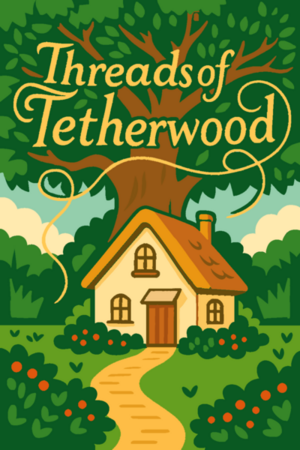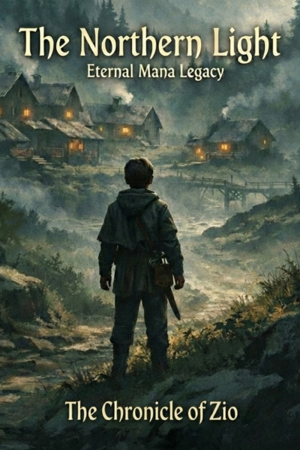Chapter 6:
Chapter 6: The Scarf of Remembering
Threads of Tetherwood
The request came on a Thursday, tucked inside a book.
Lina wasn’t expecting anything unusual that morning—just a quiet rhythm of fabric and thread, the kind that carried her through the hours without hurry. She had settled into the cottage’s reading nook, a pocket of warmth where the cushions always plumped themselves just so, and the tea tray never stayed empty for long.
She was halfway through sorting swatches—wool in one stack, silks in another—when a small cloth-bound volume slipped from the shelf as if nudged by invisible hands. Threads of the Moon: Weaving Traditions from the Seamward Isles. The cover shimmered faintly, as though the ink remembered starlight.
When it fell open, a note fluttered out.
The handwriting was careful, almost timid, but steady enough to suggest practice:
“Dear Tailor,I forget things.Important things.I believe you might be able to help.– Libby”
At the bottom, pressed between the fibers of the page, lay a tiny blue flower. A forget-me-not, its color still impossibly vivid despite the paper’s age.
Lina held it in her palm, listening. Some notes carried no sound at all, but this one seemed to hum faintly, like a thread pulled taut in a loom—waiting to be woven into something greater.
📖
The Tetherwood Library was less a building than a labyrinth. It sprawled in all directions—upward, downward, sideways—its corridors folding into each other like origami. One hallway looped back into itself, but only on Wednesdays.
Lina’s footsteps softened against the worn carpets as she wandered, past alcoves that smelled faintly of rain, staircases that twisted into chandeliers, and doorways that led to smaller doorways that led to even smaller doors. She followed no map, only the pull of the pressed flower she carried in her cloak pocket.
After several turns and more than a little doubling back, she found her.
Miss Libby, the librarian.
A tall hare in a ruffled blouse and half-moon spectacles, balanced on the rung of a rolling ladder with a leather-bound journal pressed to her chest. Her fur was a soft, faded gray, and her long ears were ribboned with bookmarks of every color, trailing like forgotten thoughts. Her face carried an odd expression—equal parts fiercely kind and perpetually worried.
She blinked down at Lina, adjusting her spectacles.“Oh! Have we met?”
“Sort of,” Lina said gently. “I got your note.”
Libby tapped her chin. “Did I send one?”
“You did.” Lina smiled, holding her gaze steady. “You asked for help remembering.”
“Oh. That does sound like me.”
With a soft sigh, Libby climbed down the ladder. She beckoned Lina along as they moved through the stacks—past whole shelves of blank books. Memoryless, Libby explained in a hushed tone, as if the books themselves might overhear. Stories unwritten, or perhaps forgotten.
They stepped into a side chamber filled with looms, spindles, and drifting dust motes that moved like slow, deliberate snow. Threads dangled from half-finished weavings, their colors dulled but still carrying echoes of brightness.
“I was a spinner once,” Libby murmured, brushing her paw over the edge of an unfinished scarf. “Before I became a keeper of stories.”
Her voice softened further. “But lately, things slip through. Names, places… even entire books vanish from my shelves. And I think—” Her breath caught. “I think I’ve lost someone. Someone important. But I can’t remember who.”
Lina felt something stir within her—not in her cloak, nor in the pressed forget-me-not she carried, but deeper. A pull like a thread running through her own heart, tugged tight and unseen.
“I can try,” she said quietly. “I don’t know everything yet. But I can try.”
Libby’s eyes shone as she gave a small, trembling smile.“That’s all remembering ever is.”
🧶
Back at the cottage, Lina sat cross-legged on the floor beside a loom. It had arrived that afternoon in the most matter-of-fact way possible: carried on the backs of three polite beetles, who tipped their hats before trundling off down the path.
The loom stood patiently, its frame a tangle of polished wood and shifting hinges, as if it wasn’t entirely sure of its own shape. Instructions had come with it—written in six different dialects, none of them complete, each page ending in ellipses as though the writer had wandered off mid-sentence.
Lina drummed her fingers against her knee. “Well,” she murmured, “how hard can weaving memory be?”
From the nearby fabric basket, a tufted head popped up. Thimblewick, ever curious. His whiskers quivered with amusement.“You’re attempting intention-spinning already? Brave.”
“Or foolish,” Lina muttered. She traced the loom’s frame with uncertain hands. “I’ve never even touched one of these before.”
“That’s not true.”
Thimblewick hopped down from the basket and padded over, his tiny paws leaving no sound on the floorboards. “You dreamt of one when you were little. Granny Harrow told me. A loom made of driftwood and lace thread, yes? It sang when you touched it.”
Lina’s breath caught. She turned sharply, eyes narrowing.“How would you know that?”
The mouse’s eyes twinkled, reflecting the lamplight like twin pins of silver.“I listen.” He tilted his head. “You should try it sometime.”
The loom gave a soft creak then, as though agreeing. Threads that weren’t there a moment ago shimmered faintly in its frame, taut with possibility.
🪡
She began with the forget-me-not thread—a pale blue skein Libby had pressed into her hands, said to be spun from “things we almost said.”
The loom resisted her touch at first. The pedals stuck, stubborn as stones. The shuttle slipped from her grip and skipped rows, tangling the pattern before it could even begin. Lina bit her lip, ready to abandon the attempt.
“Tell it a story,” said a gentle voice from the corner.
She glanced over. Moss, one of the hedgehog twins, stood with a steaming cup of peppermint tea, the scent sharp and calming in the air. He gave her a quiet nod and settled onto a cushion, his small smile carrying more encouragement than words ever could.
So Lina tried.
Her hands moved with the shuttle as she spoke aloud: about Libby’s ears ribboned with bookmarks, about the shelves of blank books waiting for their words, about the ache of knowing someone is missing from your life but not remembering who they are.
The threads listened.
They shimmered faintly at first, like dew catching morning light, then began to settle, glowing softly with each pass. The loom’s creaks turned into a rhythm, steady and sure, as if it too leaned closer to hear.
Row by row, the scarf emerged—silken and soft, its pale blue shifting with the sheen of dreams half-remembered. It seemed to hold more than cloth: a weight of absence, and the fragile hope of recovery.
The final row stretched into hours. Her shoulders ached, her fingers burned, but she did not stop. And when at last Lina tied off the edge and lifted the weaving free, the scarf settled into her hands with surprising warmth.
It pulsed faintly, alive with memory.
🧵
When Lina returned to the library, she found Libby waiting.
The hare held the scarf with both paws, cradling it as though it were something fragile and sacred. She draped it carefully around her neck. The moment the fabric touched her fur, her breath hitched.
Her eyes shimmered. For a heartbeat she looked impossibly far away—gazing into a place Lina could not follow. Then, suddenly, she was here. Entirely present, as if the missing piece had slid back into place.
“Oh,” she whispered. “Her name was Marlow.”
Libby staggered backward into a chair, laughter and tears tumbling out together. “She was my sister. She always wore yellow, and read everything upside down, and—she’s gone. But she was here.”
Lina knelt at her side, her own chest tight with the weight of the moment. “You remembered.”
“I felt her,” Libby said, clutching the scarf. “Not whole, not forever. But just enough. You didn’t fix my forgetting, Lina—you stitched it into something I could hold.”
The warmth of the scarf glowed faintly, carrying the echo of a presence both lost and found.
Lina swallowed hard, her throat aching.“That’s what stories do.”
The silence that followed wasn’t empty. It was full—of Marlow’s laughter turned to threads, of Libby’s tears woven into something she could wear, of the understanding that forgetting and remembering were never opposites, but pieces of the same pattern.
✨
Back in the tailor’s cottage, dusk settled like a shawl around the windows. Lina hung her cloak by the door, as she always did.
But tonight, something was different.
The newest patch—stitched in pale blue, the memory-thread from Libby’s scarf—pulsed softly on its own. A glowing symbol shimmered into view: 📖. A book crossed with thread, like a quill in motion.
The light spilled across the cloak’s lining, illuminating more than fabric. For the first time, Lina saw it—something the garment had kept hidden until now.
A secret pocket.
Her fingers trembled as she slipped them inside. The space was deeper than it should have been, warm with a kind of waiting. She drew out a folded scrap of parchment, yellowed with age, edges feathered soft by time.
Unfolding it, she found a single word written in careful, deliberate calligraphy:
“Remember.”
The word seemed to hum in her hands, a promise, a task, a thread leading onward.
Lina held it against her heart, the cloak rustling faintly—as if it approved.
That night, Lina sat at her writing desk, holding the parchment and looking out into the moonlight.
She didn’t write a letter.
She didn’t need to.
Some memories were best worn, not told.
And now, someone else had theirs back.
One thread at a time.
🧵End of Chapter 6




Please sign in to leave a comment.